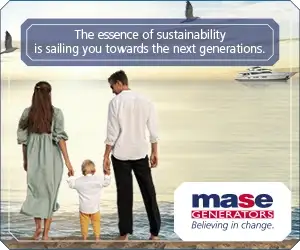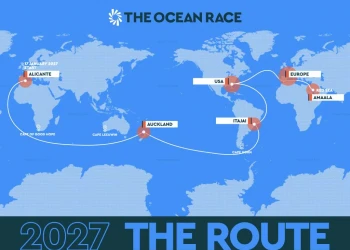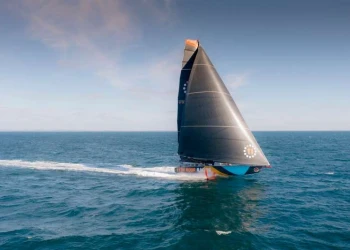
Call for ocean rights to protect Antarctica and the Southern Ocean
The Ocean Race Summit: racing to protect the Southern Ocean
The Ocean Race Summit Stockholm - Racing to protect the Southern Ocean, brought together sailors, scientists, policymakers and adventurers yesterday (Wednesday 1st June), to discuss the urgent need to protect Antarctica and the Southern Ocean.
Recognising the inherent rights of the ocean as a way of helping to safeguard and restore this crucial part of the planet was a central theme, along with the importance of collaboration between countries, even in difficult times.
Addressing the Summit, Isabella Lövin, Chair of Stockholm Environment Institute, Former Deputy Prime Minister, and former Minister for the Environment, Sweden said: “We need to be putting pressure on governments. You can’t think of limited national interests, you have to think globally. The clock is ticking; we do not have any time to waste. We need to have a new mindset. One missing piece in our conversations is humanity being a part of life itself. We cannot have this approach to life that we are both apart from it and the owners of it. We are part of nature.”
Offshore sailor Gurra Krantz, four-time competitor in the Whitbread Round the World Race/ Volvo Ocean Race (former title of The Ocean Race) spoke of how he has witnessed the decline of the marine environment: “In my view, the ocean has changed. We are accumulating so much toxic pollution it’s going to jump up and bite us. We are killing it with millions of small needlesticks.” On ocean rights he added: “It has to happen and it has to happen quickly.”
Andrea Kavanagh, Director of the Southern Ocean Pew Bertarelli Ocean Legacy Project, spoke about the need for marine protected areas in the region: “The Antarctic Peninsula is a hotspot for many activities — it is the fastest warming, the most heavily fished and the most often visited by tourists. We cannot keep fishing right on top of the penguins and whales because we are already seeing the impacts of overly concentrated fishing on these species. If countries want to keep fishing, then they must put conservation first and one way to do that is to designate a network of marine protected areas.”
Held in collaboration with the Antarctic and Southern Ocean Coalition (ASOC) and 11th Hour Racing, a premier partner of The Ocean Race and founding partner of the Race’s sustainability programme, the Summit was hosted by television presenter and science communicator Danni Washington.
An associated event of the Stockholm+50 conference, which is convened by the United Nations and hosted by Sweden with support from the Government of Kenya, The Ocean Race Summit Stockholm took place on the eve of this crucial high-level international environmental meeting (which takes place 2-3 June), in order to help put Antarctica and the Southern Ocean at the heart of discussions. Sweden has an important role in safeguarding the region as it is the Chair of the Commission for the Conservation of Antarctic Marine Living Resources (CCAMLR).
Jakob Granit, Director General for the Swedish Agency for Marine and Water Management, SwAM, and Chair of CCAMLR attended the Summit, where he highlighted that countries cannot work in solo to safeguard the region: “We need to keep the spirit of collaboration, even in these difficult times.”

The critical role that the Southern Ocean plays in the health of the planet was highlighted throughout the event, which was hosted by Volvo Cars, a premier partner of The Ocean Race, at Volvo Studio Stockholm. The Ocean Race has a strong connection to the Southern Ocean, which has been one of the most exhilarating parts of the round-the-world sailing Race for nearly 50 years, and will be the backdrop next year for the longest leg (12,750 nautical miles) in the Race’s history during the 2022-23 edition of the Race.
Author and multi world record holding sailor Lisa Blair, who broke the record for fastest solo and unassisted voyage around Antarctica on 25 May 2022, told the Summit: “I have just spent the last three months surviving and living in the Southern Ocean and for me it is the most incredible ecosystem out there. I definitely think it deserves to have a vote.”
Another speaker with a close relationship with the region, polar explorer, climate analyst, photographer and Ulysse Nardin Ambassador Sebastian Copeland said: “We need to be cognisant that the oceans have rights in the same ways that humans have rights. We need to protect those rights in order to protect ourselves.”
Members of the science community also expressed support. Ari Friedlander, ecologist and professor, Ocean Sciences & Institute of Marine Sciences, UC Santa Cruz stressed: “It is really important that we give oceans rights. I think marine ecosystems, all of nature has a voice and it needs to be heard not only for the heuristic value of nature living on its own for its own reasons but we benefit from nature.”
The event is part of a series of 12 Summits, which explores the idea of recognising the inherent rights of the ocean in order to create a universal approach to protecting the seas.
The Ocean Race Chairman Richard Brisius said: “We can only win the race for the ocean through collective ambition and action. By bringing together sailors, scientists, conservationists and policy makers at the Summit, we can take action, share knowledge and create greater impact.
“To protect the planet we need to protect Antarctica and the Southern Ocean. Recognising the ocean’s rights, by creating a universal approach to looking after the marine environment, could help make this happen. As hosts of Stockholm+50, a vital environmental conference that starts today, and as Chair of the Commission for the Conservation of Antarctic Marine Living Resources (CCAMLR) Sweden is in a strong position to lead the way in safeguarding this incredible region.”
Ulysse Nardin, the pioneering Swiss watch manufacturer that has strong links to the maritime world is the ‘Time to Act Partner’ of The Ocean Race Summits. The Summits started as a stand-alone event during the 2014-15 edition of the Race and has become one of the most important elements of The Ocean Race’s sustainability programme. The frequency of the Summits, which support the United Nations Sustainable Development Goals, has increased to reflect that there is no time to waste in tackling the threats to our blue planet.




